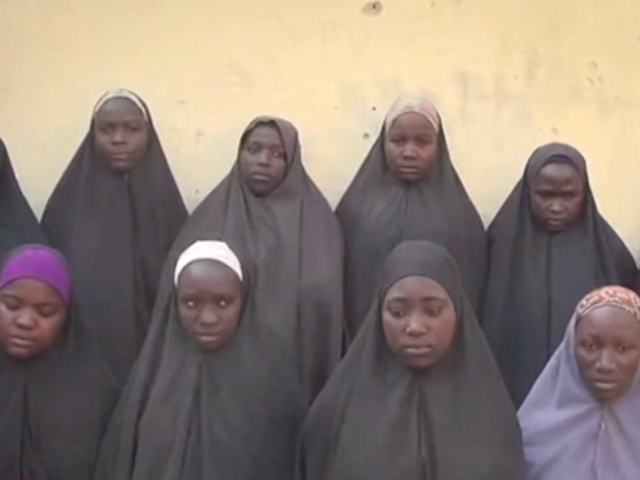On the two-year anniversary of the mass abduction of over 200 girls by the jihadist group Boko Haram in northeast Nigeria, CNN has published a video showing 15 of the victims, all wearing Islamic garb and describing themselves as “well.”
The public has not seen evidence that the girls are still alive since a video released in May 2014 showed dozens of the girls sitting in a forest, reciting Koranic verses. In the new video, the girls give their names to the camera and identify themselves as residents of Chibok, Borno, the village the now-Islamic State affiliate raided in April 2014, taking 276 girls out of a secondary school where they were taking a physics exam. 219 remain missing, and those who are free today successfully fled abduction by jumping out of moving trucks – none have been rescued.
Other than identifying themselves, only one girl speaks, telling the camera: “I am speaking on 25 December 2015, on behalf of the all the Chibok girls and we are all well.”
Two of the mothers of the girls in the video were able to positively identify their daughters, with a third mother from Chibok identifying five others. Fox News notes that Nigerian government negotiators believe the video to be legitimate, though they are cautious about how they can use it to free the girls. A source speaking to the Associated Press confirmed that they believe the video is real, but have had similar productions surface in the past that were later proven to be false attempts to swindle the government out of ransom money. “Our intelligence and security authorities… received a similar video in July last year and when they followed the lead it led to a cul-de sac,” the source explained; the were unable to identify the Boko Haram members who sent the video and contact them for further discussion.
“Negotiation will make it possible for these girls to be brought back home alive. What has always been the problem in the last few years has been the very fact there are scam negotiators, who most times make claims and don’t deliver,” Nigerian new development senator Shehu Sani told CNN. This accusation has also haunted the latest Boko Haram video release showing jihadis calling for more terrorist attacks; some have suggested the men in the video are “paid actors” used by con artists to attempt to solicit money from the government.
It is unclear why this video is surfacing now or where the Nigerian government will turn to find the Boko Haram negotiators responsible. The video follows the publication of a UK Telegraph report claiming that the Nigerian government also recently received a demand for a $56 million ransom in exchange for the girls’ freedom. Nigerian officials refused to confirm the report, noting that rumors of such ransom demands are not uncommon, and no official has tied this report to the release of the new video so far.
While the girl in the video asserts that “all” of the Chibok girls are “well,” many suspect that at least some in the group have been injured or killed. Authorities believe the girls are being kept, either together or in smaller groups, in Borno state’s Sambisa forest, Boko Haram’s last major stronghold. The forest is difficult to navigate and ideal for hiding, and the Nigerian army has launched airstrikes against Boko Haram clusters in the forest that may have included some Chibok girls.
A girl identified as “Fati” who was once a Boko Haram captive told CNN that she believes some of the girls were killed in bombings of Sambisa forest hideouts. Some have also suspected that the girls have been used as suicide bombers, as Boko Haram has significantly increased the use of captives as walking explosives recently. UNICEF published a report this week finding a ten-fold increase in the number of child suicide attacks by Boko Haram since the Chibok kidnapping. No suicide bomber, or would-be suicide bomber arrested before they could detonate their weapons, has been positively identified as a Chibok girl.

COMMENTS
Please let us know if you're having issues with commenting.